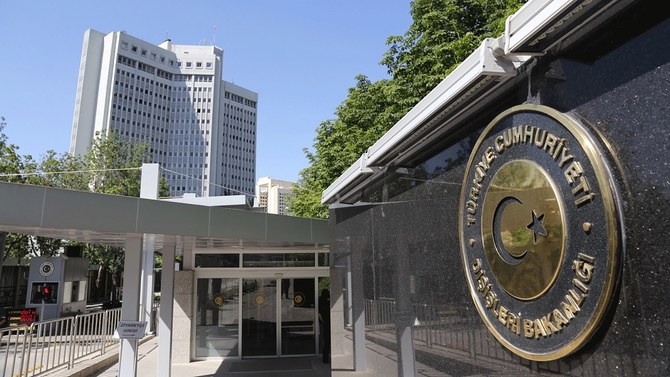ANKARA: The Egyptian foreign ministry has denied claims by the Turkish government that there has been resumption and restoration of ties with Cairo and Gulf states.
“There is no such thing of ‘resuming diplomatic contacts’,” a number of Egyptian and Arab media outlets reported, citing an unnamed official.
Diplomatic ties between the two countries exist at the level of the charge d’affaires in accordance with the diplomatic norms, the official said.
“Upgrading the level of the relationship between the two countries requires taking into consideration the legal and diplomatic frameworks that govern relations between countries on the basis of respecting the principle of sovereignty and the requirements of Arab national security,” he continued.
“Egypt expects that any country that needs to establish normal relations with it [Egypt] should abide by the rules of international law and the principles of good neighbor policy and stop attempts to interfere in the internal affairs of the countries of the region.” Turkey announced that it has resumed diplomatic contact with Egypt for the first time since breaking off relations in 2013.
Turkish Foreign Minister Mevlut Cavusoglu earlier claimed that high-level diplomatic contacts between Ankara and Cairo have resumed.
“We have contacts with Egypt both at the intelligence level and at the Foreign Ministry level. Our contacts at the diplomatic level have started,” Cavusoglu said on Friday in an interview with the state-run Anadolu Agency.
Cavusoglu said that neither side had put forward preconditions for the easing of relations.
The move is the result of months-long negotiations between the intelligence agencies of both countries.
“It is very likely that Egypt will demand that Turkey recalibrate its relations with the Muslim Brotherhood in return for a normalization of relations,” Selin Nasi, the London representative of the Ankara Policy Center, told Arab News.
Relations between Cairo and Ankara broke down in August 2013 after the removal of President Mohamed Morsi. Following those events, several members of the Muslim Brotherhood fled to Turkey.
Since then, Egypt and Turkey have often supported opposite sides in regional conflicts, especially during the Libyan war and the Eastern Mediterranean dispute.
Samuel Ramani, an academic and analyst at Oxford University, said it is “too early to tell” whether Cavusoglu’s offer to Egypt will lead to renewed relations between the two countries.
The Egypt-Greece eastern Mediterranean exclusive economic zone agreement makes Mediterranean security an unlikely theater of cooperation.
Samuel Ramani, Analyst
“Turkey is likely trying to build on the improvement of relations between Qatar, its closest Arab partner, and Egypt,” he told Arab News.
Ramani said the move is part of Turkey’s broader policy of trying to ease tensions with Arab states.
“The focus of its security policy could be moving toward Iraq with an intervention in Sinjar in northern Iraq, so Ankara might be trying to limit its fronts of conflict,” he said.
However, experts doubt whether Ankara will decrease its support for the Muslim Brotherhood, which Cairo considers a terrorist organization.
Nasi said that, given the erosion of trust between the two countries, Cairo would like to see concrete steps from Ankara on the Muslim Brotherhood issue.
Ramani, said: “I think Turkey will offer promises to Egypt informally on the Muslim Brotherhood issue, but will be cautious about public pronouncements that could create ideological splits within the ruling Justice and Development Party and Erdogan’s electoral base.”
Turkey’s military presence in Libya is also another issue that will come into play.
Ramani said that the Libya situation could result in Turkey-Egypt cooperation on a diplomatic process.
“The Egypt-Greece eastern Mediterranean exclusive economic zone agreement makes Mediterranean security an unlikely theater of cooperation. Both disagree on Syria and have different approaches to Gulf security and Israel-Palestine, too,” he said.
“The utility of expanded economic cooperation could encourage a de-escalation on both sides, but that is as far as it goes,” Ramani added.
Egypt still rejects the controversial maritime deal between Turkey and Libya’s Government of National Accord. It also signed an alternative maritime deal with Greece last year to demarcate maritime boundaries.
“Turkey reportedly wants to sign maritime delineation agreements with Israel and Egypt that are similar to the one it signed with Libya,” Nasi said.
“Egypt’s maritime zone deal with Greece appears to recognize minor Turkish claims. This was interpreted in the Turkish press as an admission of Turkish sovereignty claims in the Aegean and Mediterranean.”
However, the deal also recognizes Rhodes and Crete as part of the Greek continental shelf, undermining the Turkish-Libyan maritime deal.
“That’s why it’s difficult to say Turkey and Egypt are on the same side. For them to be on the same side, one of those maritime deals needs to be nullified,” Nasi said.


























